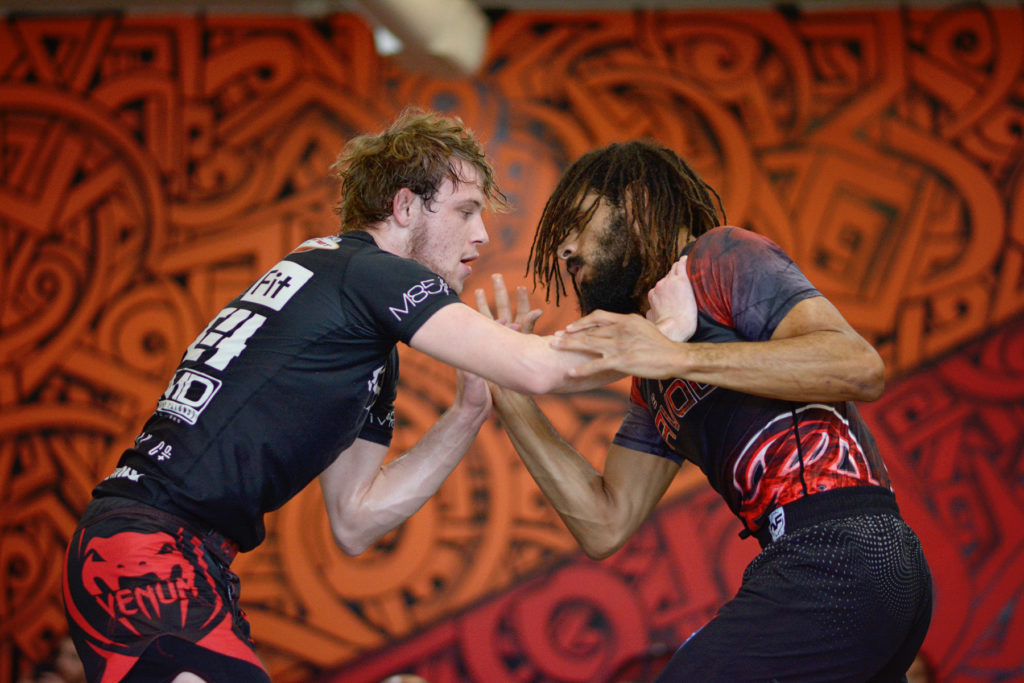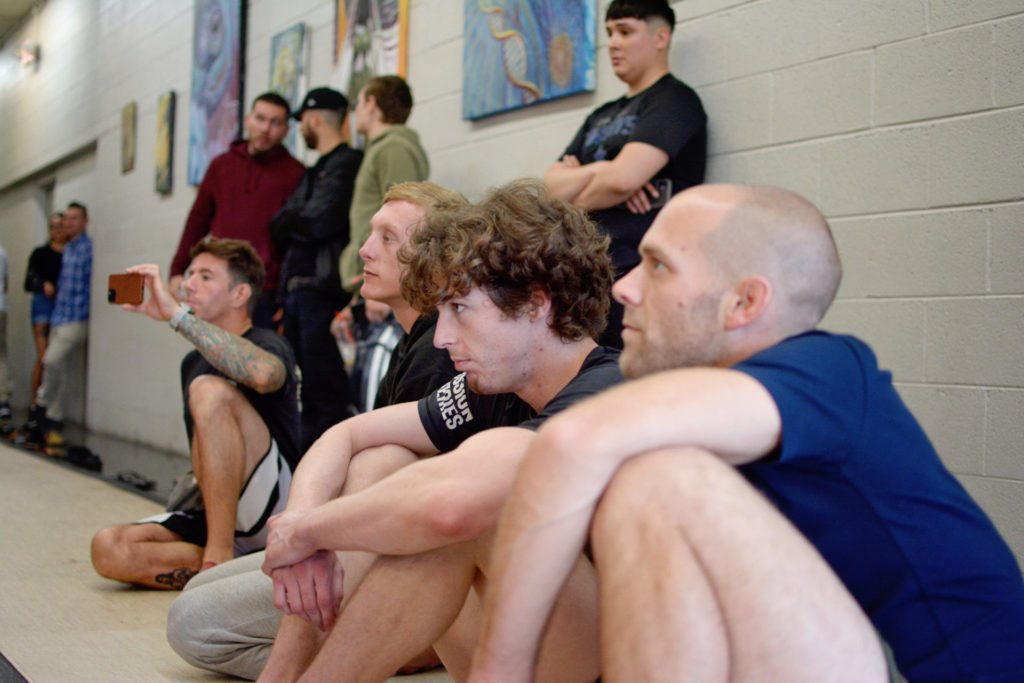Cross-training for BJJ is one of the hottest topics when it comes to improving your grappling. In fact, this seemingly straightforward topic sparks a big debate, depending on who you ask and what you mean by BJJ cross-training.
We’ve decided to address the overall issue of cross-training for BJJ, including answering the question of what people mean by this term, and whether cross-training for BJJ is a must-have, or not.
What is Cross-Training for BJJ?

Credit: “229th Military Intelligence Battalion Combatives Certification June 12 2010” by Presidio of Monterey: DLIFLC & USAG is marked with CC PDM 1.0
Before we get into muddy waters, let’s define what we actually mean by cross-training for BJJ.
In general, the term refers to performing any physical activity outside of your actual BJJ training to improve some aspect of your grappling or round out your skill set.
The following examples would all be classified as cross-training for BJJ:
- Training other martial arts to round out your fighting skills
- Lifting weights to improve your strength for BJJ
- Performing cardio to improve your endurance for BJJ
- Stretching or other mobility training to improve flexibility for BJJ
As you can see, cross-training for BJJ is not a singular type of activity and includes a wide range of goals and activities that complement or otherwise work alongside your standard BJJ training.
Do You Need to Cross-Train for BJJ?
Now that you have a working definition of cross-training for BJJ, you might be wondering whether you need to cross-train for BJJ.
There is no ‘right answer’ to this, and it really depends on your specific goals for your BJJ training.
The following questions can help you decide whether to cross-train for BJJ, and if so, which form of BJJ cross-training you should perform.
What Are Your Goals in BJJ?
It is virtually impossible to answer any ‘should I do X for BJJ?’ question without reflecting on your goals in BJJ.
The next section breaks down a few different goals you might have, and how to think about BJJ cross-training in the context of each goal.
Self-defense

Credit: “170304-Z-VX101-2028” by New York National Guard is licensed under CC BY-ND 2.0
For example, if you train BJJ to learn self-defense, you should consider the overall needs in self-defense situations.
Self-defense requires a combination of grappling, striking, situational awareness, and weapons training.
If you are already a combat veteran, law enforcement officer, or other person with a background in combat, then you are probably already cross-training, or have enough experience with fighting that you do not need to double up on boxing, Muay Thai, or tactical training.
If you want to learn BJJ for self-defense and have no background in any martial arts, then you should seriously consider adding other forms of training to round-out your self-defense skills.
This could include activities such as boxing, MMA grappling, and boosting the ‘mindset’ side of self-defense training.
While some BJJ schools include a self-defense curriculum in their system, many BJJ schools only train the competition style of BJJ grappling. While this training certainly applies to self-defense, it is far from a complete system and you’ll need to round it out with some additional martial arts.
Competition BJJ

Image: Bullpen Kumite 2021
If you plan to be a serious competitor in Brazilian Jiu Jitsu, you will have different needs compared to recreational BJJ players.
Competitive BJJ requires solid technique, a good base of strength and cardio, and pre-emptive injury prevention via a good mobility routine for BJJ.
Depending on your athletic background, you might want to dial-in on the aspects you are weakest in while ensuring you relentlessly improve your actual BJJ technique and skillset.
Are you a previous high-level field athlete with a good base of strength and cardio?
If so, you might consider an extra strength and conditioning session once or twice per week and focusing primarily on BJJ technique and rolling.
Do you have experience with powerlifting or bodybuilding?
If yes, you are probably plenty strong for BJJ and would be best served by improving your technique, cardio, and flexibility.
Are you a technically proficient BJJ athlete who lacks the extra gas tank or strength to beat similarly skilled opponents?
In this case, adding in 3 to 4 days of strength and conditioning while maintaining your BJJ technique base could be the key to taking your competitive BJJ to the next level.
BJJ for fitness

Many people train BJJ primarily as a form of fitness and general exercise.
Let’s face it, not everyone enjoys traditional cardio or weight lifting for BJJ.
In this case, BJJ is a great form of exercise and is always better when compared to doing nothing at all.
Nevertheless, for a truly well-rounded fitness program, adding in some general strength training and flexibility will round-out your fitness.
You don’t have to lift weights 4 times a week for 2 hours, but adding a maintenance strength program will help prevent injuries and keep your overall body functioning well even if BJJ is your primary exercise activity.
BJJ for fun
You might just be somebody who enjoys grappling for what it is, likes rolling, and really don’t care much about the previously discussed points.
In this case, maybe you don’t need to cross-train. With that said, it is still worth considering. After all, BJJ is a lot more fun when you aren’t dead tired or so weak you can barely apply basic technique.
Maybe you do not care, and that is fine.
By all means, keep up your grappling training, don’t cross-train off the mats, have fun at BJJ, and spend your non-BJJ free time on other things you enjoy.
The downsides of cross-training for BJJ
You can probably tell that we are generally in favor of cross-training for BJJ. However, we want to give the devil his due and make sure you’re aware of the downsides.
There are two primary downsides to cross-training for BJJ, discussed in the following section.
The extra time requirements
If you’re like most people, carving out three nights per week to train BJJ may already be a demanding sacrifice.
We get it. Kids, career, social life, Cobra Kai binges – you’ve got a lot on your plate.
For some of us, the added time for cross-training would require us to train less BJJ, and that may be counter to your primary reasons for training.
If this is the case, the opportunity cost may be too much of a burden, and not something that’s worth it to you personally.
This boils back down to your goals in BJJ. Obviously, the bigger your goals, the more commitment required. Most of us training BJJ are not trying to win IBJJF worlds, and as such, additional training might be a lower priority.
The recovery needed
Let’s say you decide that your goals for BJJ require you to cross-train. Whether that be for self-defense or BJJ competition, you’re fully committed to maximizing your gains.
…pretty much every method of BJJ cross-training puts additional demand on your physical system…
In that case, the next problem you’ll run into is recovery.
Training BJJ is physically demanding.
Training other martial arts is physically demanding.
Strength training is physically demanding.
Cardio is physically demanding.
As you can see, other than a pure flexibility routine, pretty much every method of BJJ cross-training puts additional demand on your physical system.
There is only so much punishment your body can take before needing some serious physical recovery, and that means putting less time and effort into each aspect of cross-training compared to focusing on a singular aspect of the sport.
Even with all the time in the world, pushing yourself to the physical limit day in and day out will eventually cause you to crash. Each of us might hit the point of overtraining at a different level of activity – but rest assured, it happens to all of us, even elite athletes.
Overall, a commitment to BJJ cross-training requires a fine line of pushing yourself physically while ensuring you can still recover.

Source: Bullpen Kumite 2021
This may mean focusing on more BJJ technique and less live-rolling if you are putting a lot of effort into building up your strength base.
On the other hand, if you are dialing in for a specific competition with lots of intense live rolling, you will have to reduce your time spent in the weight room to allow full recovery.
This balance is completely possible, but it takes more thought than just mindlessly following a fitness routine from someone who doesn’t understand BJJ.
It also means you must set your own training boundaries on the mats if you are putting effort into building your overall athletic base – particularly if you workout separately from your BJJ gym.
Reflect on Your BJJ Goals
If you’ve taken some time to reflect on the above discussion points, you should be well on your way towards picking your primary cross-training method for BJJ.
Once you’ve assessed your goals in BJJ, you can decide exactly where to specifically spend your efforts, or not, when it comes to BJJ cross-training.
The Best Cross Training for BJJ
While this article is not meant to be the be-all-end-all source of cross-training routines, the following are a few suggestions to add cross-training for BJJ depending on your specific goals.
BJJ Cross-Training for Self-Defense
If your goal is self-defense training, you should consider adding at least one of the following martial arts systems to your plan:
Cross-Training for BJJ Competition
If you want to add that extra strength, stamina, and athleticism for BJJ, consider one of the following:
- Weight training for BJJ
- Flexibility for BJJ
- Cardio for BJJ
General BJJ Fitness
General fitness for recreational BJJ should include both weights, cardio, and flexibility, similar to training for competition.
The biggest difference is you will be doing fewer weights and cardio compared to competitive athletes, however, the overall needs for fitness are similar in terms of the general activities.
Check out the following video for a breakdown on some of the top exercises for BJJ:
Cross-Training for BJJ: the bottom line
There is no singular answer to whether you should cross-train for BJJ, and what that cross-training should look like.
Reflecting on your goals in both BJJ, life, and your overall time and routine should drive your decisions when it comes to BJJ cross-training.
The one thing to understand is the more thought and effort you put into both your BJJ training itself, your cross-training, and overall lifestyle and recovery, the better of a martial artist you’ll become.
Whether you train BJJ for self-defense, competition, or just general fun, a purposefully chosen cross-training routine for BJJ will improve your overall experience in Brazilian Jiu Jitsu.
Explore similar topics:
- The Best BJJ Strength and Conditioning Program
- The Best BJJ Kettlebell Workouts
- Is BJJ Good for Weight Loss?
Explore other topics:





